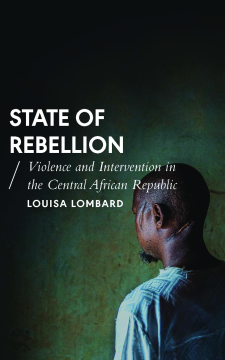
Additional Information
Book Details
Abstract
Shortlisted for the Fage and Oliver Prize 2018
In 2013, the Central African Republic was engulfed by violence. In the face of the rapid spread of the conflict, journalists, politicians, and academics alike have struggled to account for its origins.
In this first comprehensive account of the country’s recent upheaval, Louisa Lombard shows the limits of the superficial explanations offered thus far – that the violence has been due to a religious divide, or politicians’ manipulations, or profiteering. Instead, she shows that conflict has long been useful to Central African politics, a tendency that has been exacerbated by the international community’s method of engagement with so-called fragile states. Furthermore, changing this state of affairs will require rethinking the relationships of all those present – rebel groups and politicians, as well as international interveners and diplomats.
An urgent insight into this little-understood country and the problems with peacebuilding more broadly.
Louisa Lombard is an assistant professor of anthropology at Yale University. Previously she held a Ciriacy-Wantrup postdoctoral fellowship in natural resource economics at the University of California at Berkeley. She has published widely on politics and conflict in Central Africa. In addition to her academic research, she has worked in the Central African Republic as a field consultant to several international organizations, including Human Rights Watch, Small Arms Survey, Refugees International, and the World Bank. Her previous books include Making Sense of the Central African Republic, co-edited with Tatiana Carayannis (Zed Books, 2015).
Shortlisted for the Fage and Oliver Prize 2018
‘Brilliant ... Provides a magisterial reading of the role of violence in the making of the CAR. Authoritative, nuanced, and empirically rich, Lombard offers a new and compelling lens through which so-called state failure and post-conflict transitions can be understood.’
Michael Watts, University of California, Berkeley (Emeritus)
‘This valuable, indeed important, study helps us make sense of a little-known but strategically important African country. Those who wish to know Africa today need to know this book.’
Paul Richards, author of No Peace, No War: An Anthropology of Contemporary Armed Conflicts
‘If you want to understand why the CAR seems a perpetual work in regress, then Louisa Lombard’s book is a must read. Her new perspectives illuminate a neglected recess of globalization.’
Stephen W. Smith, Duke University
‘In this stimulating and provocative book, Louisa Lombard proposes a new approach to peace-keeping, peace enforcement and humanitarian action that rests upon a politics of redistribution and acknowledgement of the social dignity of fighters lacking a state.’
Jean-François Bayart, Graduate Institute Geneva
‘With a stunning combination of conceptual clarity and vivid ethnography, Louisa Lombard’s book challenges conventional wisdom on the roots of violence in the CAR. A must-read for anyone wanting to engage with current debates on peace-building and state-building initiatives.’
Marielle Debos, author of Living by the Gun in Chad
'A must-read for comparativists and IR scholars interested in peacebuilding, the state, and African politics, as well as for policy makers involved with these issues in the CAR and beyond.'
African Affairs
Table of Contents
| Section Title | Page | Action | Price |
|---|---|---|---|
| Front Cover | Front Cover | ||
| About the Author | iv | ||
| Title Page | v | ||
| Copyright | vi | ||
| Contents | vii | ||
| Acknowledgements | ix | ||
| Abbreviations and Acronyms | xiii | ||
| Map of the Central African Republic | xvi | ||
| Introduction | 1 | ||
| 1. Conflict and the State in the Peace-Kept World | 27 | ||
| Welcome to Car | 27 | ||
| Still Fighting for the Rainforest? | 32 | ||
| Rituals, Social Emotion, and Anomie | 50 | ||
| Conclusion | 56 | ||
| 2. The Nativeness of ‘Foreign’ Violence | 59 | ||
| Introduction | 59 | ||
| Adventurist Politics | 63 | ||
| Violence and the Problem of Oversight | 71 | ||
| 3. Mobility as Power | 85 | ||
| Introduction | 85 | ||
| Mobility as Power and Cross-Cutting Tie | 87 | ||
| The Strength of State Desires | 101 | ||
| Conclusion | 110 | ||
| 4. Long and Short Histories of Rebellion | 113 | ||
| Introduction | 113 | ||
| Insurgency and Entitlement in Conceptions of the State | 115 | ||
| The Region, the Good Intentions Crowd, and the Problem of the State | 124 | ||
| Rebellion Anew | 129 | ||
| 5. DDR and the Frustration of Desires for Entitlement | 141 | ||
| Introduction | 141 | ||
| DDR Rationales | 147 | ||
| PRAC (2004–2007) | 152 | ||
| Steering Committee (2009–2012) | 160 | ||
| Waiting: Promises and Threats | 169 | ||
| 6. War as the Violence of the Pack | 177 | ||
| Introduction | 177 | ||
| Making Sense of Violence at the Time and After the Fact | 183 | ||
| Foreign Bodies as Dangerous and Illegitimate | 186 | ||
| Justice, Punishment, and the Invisible World | 192 | ||
| Cannibalism | 199 | ||
| Soldiers Who Lynch | 205 | ||
| Conclusion | 210 | ||
| 7. World Champion of Peacekeeping | 213 | ||
| Introduction | 213 | ||
| Uncertainty | 215 | ||
| Social Cohesion and Suspicion | 219 | ||
| On Dislike: An Interlude | 223 | ||
| Divining the Truth | 226 | ||
| Who Is In Charge? | 237 | ||
| Conclusion | 243 | ||
| Saving the State | 247 | ||
| In Closing | 252 | ||
| Notes | 255 | ||
| References | 265 | ||
| Index | 277 |
